by Ken Sehested
This article, written in May 1995 to interpret the Baptist Peace Fellowship of North America’s “Statement on Justice and Sexual Orientation,” was first printed in the Spring/Summer 1995 issue of Baptist Peacemaker, the BPFNA's quarterly journal. An edited version of this article was reprinted in Walter Wink’s book, Homosexuality and Christian Faith: Questions of Conscience for the Churches, Fortress Press, 1999.
Culturally speaking, nothing seems to divide people more than the question of sexual orientation. At the center of this cultural wrestling match are the Christian churches. Much of the rationale for condemning homosexual behavior, even in secular institutions, is anchored in appeal to the Bible. Even the language of jurisprudence is affected by biblical tradition, with so-called “sodomy laws” criminalizing homosexual activity.
We Baptists are on the verge of devouring ourselves in this dispute. But we’re not alone: virtually every mainline Protestant body along with the Roman Catholic church is embroiled in the controversy at the highest levels. Though the debate is less widespread within the “evangelical” side of the Protestant spectrum, the topic is sufficiently threatening to prompt preemptive maneuvers, as with the Southern Baptist Convention’s recent constitutional amendment—the first in its 150-year history—prohibiting membership to congregations which condone homosexuality. (Voting “messengers” to this year’s convention must attest to that article of faith with their signature during registration.)
In the public arena, “the gay agenda” has replaced the “communist threat” as the battering ram of reactionary politics. Instead of a commie behind every bush, there’s now a queer in every classroom, in every congressional committee room, in every battleship wardroom. Many have predicted that questions around sexual orientation will divide churches more severely than at any time since the debate over slavery a century and a half ago.
We find ourselves in the midst of a major public controversy. And my heart is heavier than it’s ever been. Why such anxiety? There have been other controversies. We took a very public stand against a very popular war in the Persian Gulf. We’ve engaged in acts of civil disobedience when convinced that holy obedience was at stake. There have been overseas trips involving a level of physical danger. So why the fearful heart now?
Because this subject is different. Simply raising the subject of homosexuality for discussion dredges up some of the most volatile passions in the human soul. Baptist journals that have rarely mentioned the BPFNA in 11 years now devote full editorials to our actions for gay and lesbian justice. Long-term friends threaten disaffiliation.
I’ve had nightmarish visions of 11 years of patient network building run aground and splintered, not to mention ambitious new plans for the future. It’s not so much the withdrawal of financial support from the American Baptist Churches that poses a danger. From the beginning, we chose to develop a financial base of member support rather than rely on institutional funding. More threatening is the prospect of losing the confidence of mainstream Baptist leaders around the world with whom we work.
Given the tension often accompanying the question of sexual orientation, and the admittedly tenuous nature of our organization, it’s fair to ask, “Why did the BPFNA board choose to wade into these troubled waters?” We have been interrogated both by those with principled convictions and those with pragmatic considerations. The latter warn us that we can’t take on every issue; that we will lose the solid core of our constituency for involvement on issues of broader consensus.
Each of these objections, and a few more, have been mental wrestling partners worthy of Jacob’s angel at the Jabbok. Each has had not just one but several nights to work me over. Moreover, my personal passion rests in other arenas. Domestically, our cities are being wrecked by violence, often with racial overtones. Virtually every leading social indicator of human health in the African American community is lower now than when in the U.S. riots scorched our conscience a generation ago. Our addiction to guns needs attention from communities of faith. Fully one-fifth of U.S. children live in poverty.
The struggle of Cuba to be free of U.S. imperial designs has a grip on my imagination. Additionally, we have privileged conversation with Baptists in a dozen countries involved in leadership to mediate civil strife and in movements of nonviolent resistance to injustice.
Isn’t all this at risk when you address the question of justice in relation to sexual orientation? Yes. Aren’t you in danger of losing your credibility across the board for the sake of this one point of attention? Could be. And what about your efforts to show the connection between biblical faith and matters of justice and peace? Aren’t you in danger of undermining that influence when you take a position in apparent opposition to that of the Bible? That is a possibility.
Then why take the risk? Don’t all these other involvements stretch your resources and threaten your existence enough, without adding the most volatile issue of all?
Why Take the Risk?
My response to this composite portrait of actual questions is three-fold. First, this is, simply, the right thing to do. Matters of justice cannot be segregated. Of course we have to make choices, live within time and resource limitations. Often the hardest thing about our work is deciding what not to do, for there are so many points at which we could make a difference. Many of us, myself included, have resisted for too long speaking out on matters of simple human and civil rights for gay/lesbian people.
And while we can never be free of the need to make calculated choices, there comes a point when such calculation becomes compromise. After long hours of sometimes painful discussion, the BPFNA board has become convinced that the time for us is now. We hope our members and readers will join us in active and public opposition to gay-bashing—or, at least not abandon our larger mission in disputing our discernment at this one point.
Second, we have a ready-made opportunity to practice our calling as reconcilers within our own household. Gay and lesbian brothers and sisters are among our fellowship. We have listened to their stories. We know something of their pain. To continue formal silence in this regard would involve us in a profound level of hypocrisy.
Nonviolence is more than refusing to shoot someone. Nor is it to be confused with passivity or with sectarian withdrawal (in the name of moral purity). Rather it involves a commitment to willingly enter a situation of conflict, to absorb the assault (in this case, mostly of the verbal and emotional variety) without resort to revenge, to listen with empathy to the “enemy,” which involves the willingness to have your mind changed. In occasions like ours, no amount of voting will bring healing. Parliamentary procedure must give way to the discipline of reconciliation.
Finally, there is no way to dodge the question of biblical authority. Although homophobia is a virulent force within the church as well as the larger culture, and although appeals to “biblical authority” often mask prejudice, there are those for whom genuine fidelity to Scripture is at stake. It also is for me.
What the Bible Does, and Does Not, Say
Homosexual behavior is mentioned in seven texts, four in Hebrew Scripture, three in the New Testament. The first text, Genesis 19, is the most common text of reference. It’s the story of Sodom and Gomorrah, of Lot and the visit of the three angels. (The second of seven texts, in Judges 19:22-25, is a parallel retelling of this story.)
The narrative is familiar. The angels approach Sodom, when they encounter Lot sitting in the gate of the city, and accept his invitation of hospitality. After a meal, “the men of the city. . . both young and old, all the people to the last man” come banging on the door.
The Sodomites demand to see the newly-arrived guests, demanding to “know” them. Lot refuses, offering to send out his two virgin daughters instead. Just as the crowd gets unruly, the angels rescue Lot from their midst, shut the door and strike the mob blind. Lot and his kin are commanded to leave immediately because of the impending destruction. They flee, instructed not to look back. Brimstone and fire rain over the cities. But in the escape, Lot’s wife looks back and turns into a pillar of salt.
Three things are especially important here. First, Sodom and Gomorrah are already under sentence. In chapter 19, the heavenly messengers reveal that their mission is to destroy the cities. They want Abraham to know so that “he may charge his children and his household after him to keep the way of the Lord by doing righteousness and justice” (v. 19). The condemned cities obviously have not done so. Second, the context does make clear that the men of Sodom have sexual intentions with regard to the guests in Lot’s house. But the intention is not so much homosexual activity as it is rape. And the principle impulse in rape—whether homosexual or heterosexual—is not about sex. It is about power. Homosexual rape was a common form of humiliation and domination committed against defeated armies in the ancient world, as it is in modern prisons today.
Third, you would assume that if Sodom and Gomorrah’s sin was homosexual activity, other authors in the Bible would make that connection. But nowhere does that happen! Listen to Ezekiel: “This was the guilt of your sister Sodom: she and her daughters had pride, excess of food, and prosperous ease, but did not aid the poor and needy. They were haughty and did abominable things before me” (16:49-50).
Amos warns that Israel will be overthrown just as God overthrew Sodom and Gomorrah (4:11) and for the same general reason: the poor are oppressed and the needy are crushed (4:1). Also in Isaiah: the people of Jerusalem and Judah “proclaim their sin like Sodom” (3:9). The charge? “Your hands are full of blood” (1:15); “the spoil of the poor is in your houses” and for “grinding the face of the poor” (3:14, 15). Indeed, “the daughters of Zion are haughty” and are “glancing wantonly with their eyes” (3:16). Also in Zephaniah: “Moab shall become like Sodom, and the Ammonites like Gomorrah” (2:9), for these have filled houses “with violence and fraud” (1:9).
The only New Testament reference to Sodom and Gomorrah comes from Jesus, who predicts a similar judgment in his own day (Matthew 10:14-15). Who will receive it, and why? Those towns which do not provide welcome and sustenance to his appointed missionaries who are to travel the countryside preaching and healing.
In all these references to the sin of Sodom and Gomorrah, the issue is wantonness. It is about domination of others, about malignant power, about God’s intended shalom—harmony, right-relatedness. In each, God-relatedness and just relations among God’s creatures are intimately linked. Spiritual realities and socio-economic realities are mirror images.
The second pair of texts in the Old Testament that mention homosexual behavior, in Leviticus (18:22 and 20:13), are nearly identical commands forbidding a man to lie with another man “as with a woman.” Both judge such activity (as in Genesis 19) as an “abomination.” Note here that the word “abomination” is not a moral/ethical term. Rather, it is always used to indicate a serious breach of ritual purity law. Other “abominations” before God include eating pork, misusing incense and intercourse during menstruation. These and many other prohibitions are connected to questions of what is clean and what is unclean in the eyes of God. The issue of clean and unclean becomes important in the final section of this article.
The dilemma in making this Levitical text normative for faith is what we do with other prohibitions in this same material. Wearing garments made of two different materials is also prohibited, as are sowing a field with two kinds of seed, cutting one’s hair where it meets the temple of a human face—among a host of other commands, commands which the church has never declared normative.
The remaining three biblical references to homosexual activity appear in the Pauline letters. The Gospels, oddly enough, are utterly silent at this point. “Sodomites” are mentioned in lists of “wrongdoers” (1 Corinthians 6:9-10) and “the lawless and disobedient” (1 Timothy 1:9-10). In both these listings, however, there is considerable evidence that the language used indicates a condemnation of pederasty—the sexual and/or economic exploitation of children, particularly young boys—rather than against homosexual activity per se. In a similar way, Paul’s description of women who “exchanged natural relations for unnatural” and of “men committing shameless acts with men” (Romans 1:26-27) is set within a larger context of idolatry. Pagan temple cult prostitution, using adult men and women as well as young boys, was common in that day.
Even if you discount these contextual factors, even if you disregard all alternative explanations set out above, there’s still a major issue of consistency in our notions of biblical authority. The preface for that issue has been mentioned: what about all those other prohibitions? The Bible prohibits gluttony at least as many times, even calling it a form of idolatry at one point (Philippians 3:19). Some 60 percent of the U.S. population is overweight, a percentage I would guess to be reflective of churchgoers. All but a tiny handful, who have biological disorders, are clearly gluttonous. Why not exclude these from our congregations? More caustic for us, especially we Baptists, is the Bible’s repeated authorization for the institution of slavery. This year marks the 150th anniversary of the split among white Baptists in the U.S. over the issue of whether missionaries could also be slave holders. It’s right there in the Bible, in simple language: “Slaves, obey your masters” (Ephesians 6:5).
The apparent disparity between biblical teaching on sexual morality and modern standards of church discipline is nowhere more evident than on the issue of divorce. Nowadays, divorce and remarriage are rarely cause for expulsion from the congregation. This is true (even in the more morally-strict evangelical circles) even though Jesus clearly asserts the charge of adultery (Matthew 5:31-32, Luke 16:18, Mark 10:11-12).
The simple language of Scripture prohibits women wearing gold jewelry, braiding their hair and wearing expensive clothing (1 Peter 3:3). In other words, gold wedding bands are a sign of apostasy! And not only are women to be silent in church (1 Corinthians 14:34), they also are to have their heads covered and their faces veiled (11:5-6).
Fasting is everywhere a discipline in Scripture, but almost never in our churches. Paul warned the church at Corinth to “not forbid speaking in tongues.” Rarely is such behavior sanctioned in our churches. In that same letter, he urges the unmarried to remain that way, judging it “better.” “Do not seek marriage” is his plain advice. (Except if you can’t control your passion—implying that the New Testament foundation for marriage is uncontrollable sexual appetite.) He hedged, of course, noting that “I have no command of the Lord” (1 Corinthians 7:25). Does that mean this part of Scripture is not divinely inspired? Taken together with Jesus’ teaching that disciples will renounce biological family ties, where does this leave the “family values” movement?
The only time Jesus explicitly names the kinds of folk who are headed for eternal damnation, the only ones on the list are those who did not provide food for the hungry or drink for the thirsty, did not welcome strangers or provide clothing to the naked, did not visit prisoners. Maybe the Southern Baptist Convention should indicate that question on its messenger registration cards and ask for a signed attestation. These and dozens of other plain stipulations are routinely overlooked by even the most ardent defenders of biblical authority.
The interpretive layers in these questions are as subtle as they are many. I am convinced, however, that Scripture does have within its text an insight which helps us deal with these questions, a narrative relevant to questions of sexual orientation and biblical fidelity.
The Jerusalem Protocol
The story in Acts 10 is almost as familiar as that of Genesis 19. Beginning here and moving on through chapter 15 is the narrative accounting the struggle of the early Christian community as it moved from a parochial to a universal mission. The key characters of chapter 10 are Cornelius, a God-fearing Gentile, and Peter. First, Cornelius has a vision from God telling him to locate Peter. Peter likewise has a vision, of animals descending from heaven on a sheet. He’s instructed to eat them; but these are unclean and compliance would be an “abomination” according to the Bible. His refusal is met with this rebuke: “What God has made clean, you must not call common or profane.”
All of this is visionary preparation for Peter’s being willing to commit an abomination—to associate with Cornelius, a profane, unclean Gentile who by definition is a religious pervert—at the prompting of a “holy angel” which is identified later in the chapter as the Holy Spirit.
In subsequent chapters this theological confusion over what is and is not the divinely inspired Word of God is eclipsed by a bevy of stories about the trials of early Christian missionary work: of the journeys of Paul and Barnabas, tales of persecution and imprisonment, the martyrdom of James. Chapter 15 hints at the coming doctrinal debate in the church with a report that certain Jewish Christians from Judea were insisting on the fundamentals of the faith: circumcision for the newly-converted Gentile believers and, by implication, accountability to the law of Moses. They were insisting on the authority of the Bible.
Then comes the fight on the floor of the convention in Jerusalem. Missionary stories of revival breaking out among the (religiously perverted) Gentiles are told with jubilation. But some of the fundamentalists are upset that these converts are not being required to believe the Bible is literally true. The missionaries have gone soft on the “law of Moses.”
The more conservative leaders argue that you either believe all of the Bible or none of it. Either it’s authoritative or it’s not. And the Bible (the “law of Moses”) commands circumcision—the texts are plain, their meaning is indisputable.
Finally, Peter stood up and said, in effect: “I know what the Bible says. What I’m telling you is that I’ve seen indisputable evidence of the work of the Holy Spirit in the lives of these Gentile-perverts. God has cleansed their hearts by faith and has made no distinction between them and us. We don’t exactly have a perfect track record when it comes to being faithful to the Bible ourselves.”
Peter was on to something important. His was a precedent-setting theological argument: clear evidence of the presence of the Holy Spirit—evidence attested to in the Bible—overrules any particular regulation. The regulations, in other words, are in service to the Spirit, not the other way around. I call it the “Jerusalem Protocol.” The idea is ancient and deeply biblical: “The only thing that counts is faith working through love,” according to Paul (Galatians 5:6). Fidelity to the Bible, to paraphrase Jesus, can be summarized in two intertwined statements: “You shall love the Lord your God with all your heart, and with all your soul, and with all your mind” and “your neighbor as yourself” (Matthew 22:37-40).
Is homosexuality compatible with Christian faith? Is heterosexuality compatible with Christian faith? Uncircumcised, or circumcised? Neither question, I would suggest, is relevant. To quote sacred Scripture, "We believe that we will be saved through the grace of the Lord Jesus, just as they will" (Acts 15:11).
# # #
©Ken Sehested @ prayerandpolitiks.org


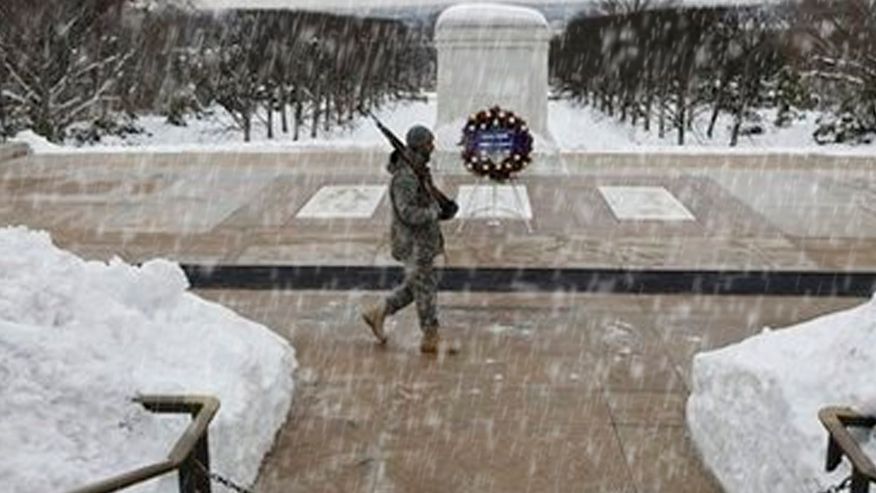 Above: Tomb of the Unknown Soldier, Arlington National Cemetery, Virginia
Above: Tomb of the Unknown Soldier, Arlington National Cemetery, Virginia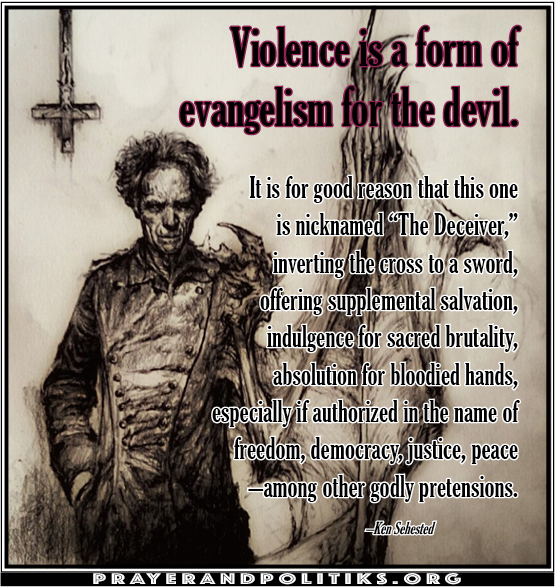 the full texts, are posted below.
the full texts, are posted below. § § §
§ § § as a spring festival for many countries in the northern hemisphere.) On May 1, 1930, 10,000 VFW members staged a rally at New York's Union Square to promote patriotism. Through a resolution adopted in 1949, 1 May evolved into Loyalty Day. Observances began in 1950 on April 28 and climaxed 1 May when more than five million people across the nation held rallies. In New York City, more than 100,000 people rallied for America. In 1958 Congress enacted Public Law 529 proclaiming Loyalty Day a permanent fixture on the nation's calendar.
as a spring festival for many countries in the northern hemisphere.) On May 1, 1930, 10,000 VFW members staged a rally at New York's Union Square to promote patriotism. Through a resolution adopted in 1949, 1 May evolved into Loyalty Day. Observances began in 1950 on April 28 and climaxed 1 May when more than five million people across the nation held rallies. In New York City, more than 100,000 people rallied for America. In 1958 Congress enacted Public Law 529 proclaiming Loyalty Day a permanent fixture on the nation's calendar. Congress, 18 December 2001.
Congress, 18 December 2001.
 ¶ The Spirit’s intercession for the world. “
¶ The Spirit’s intercession for the world. “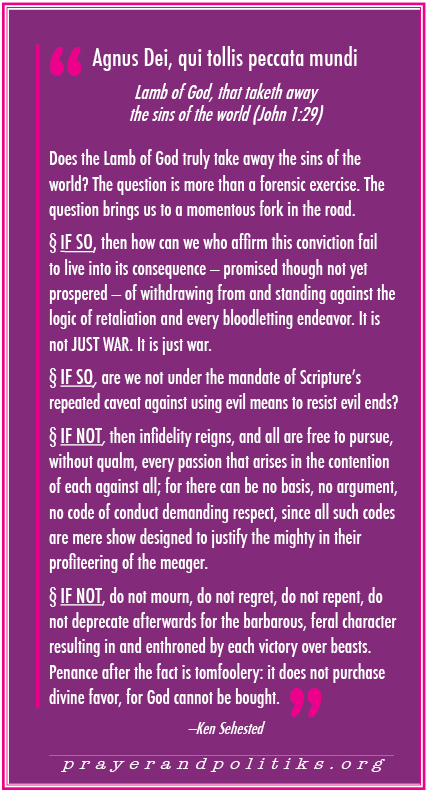 ¶ Altar call. “Many are the hearts that are weary tonight, / Wishing for the war to cease; / Many are the hearts looking for the right / To see the dawn of peace.” —refrain from “
¶ Altar call. “Many are the hearts that are weary tonight, / Wishing for the war to cease; / Many are the hearts looking for the right / To see the dawn of peace.” —refrain from “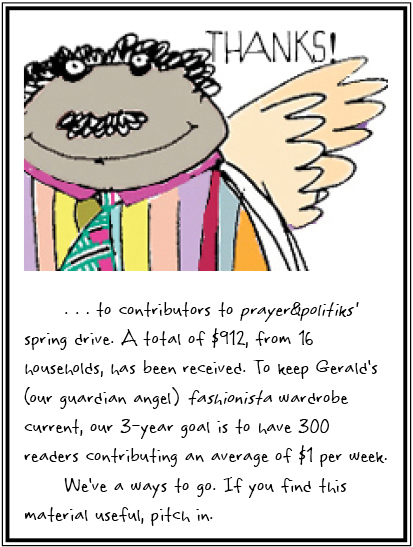 • “
• “
 we have not disappeared. After more than a century of decline, the number of Black farmers is on the rise.” —
we have not disappeared. After more than a century of decline, the number of Black farmers is on the rise.” —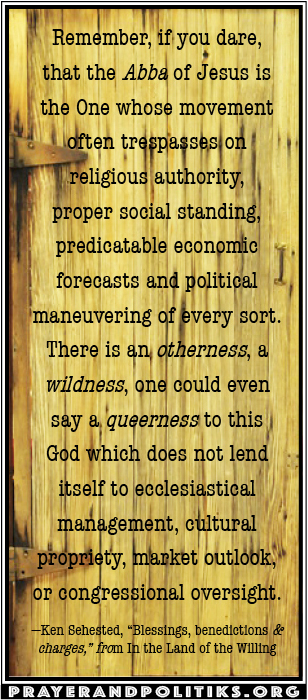 thought it was a phase, but came to accept it, and 15 years later Jake made his new name and gender official.” —
thought it was a phase, but came to accept it, and 15 years later Jake made his new name and gender official.” — ’em go, they might not wanna pass.” —Iris Dement, “
’em go, they might not wanna pass.” —Iris Dement, “ the Divine Episcopal Cathedral in New York City held its 18th annual “blessing of the bicycles.” Here is a brief
the Divine Episcopal Cathedral in New York City held its 18th annual “blessing of the bicycles.” Here is a brief 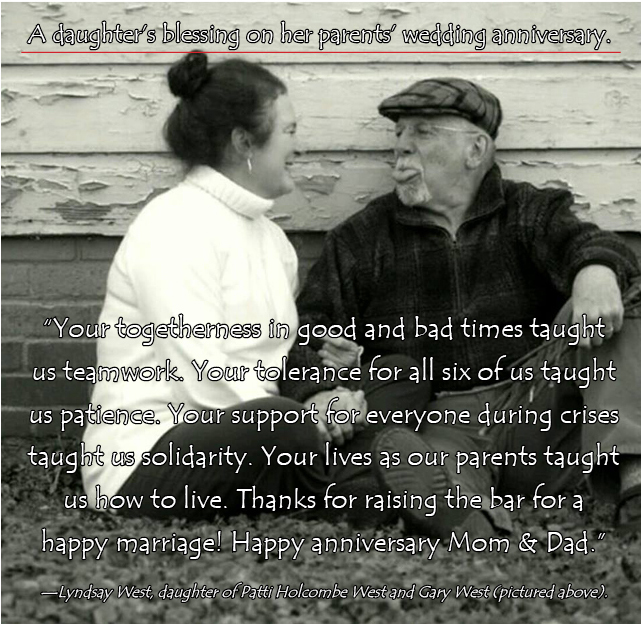 is said that when Jesus rescued the wedding feast at Cana, turning common water into vintage wine, it was done to reveal the glory of God. Don’t you like that—for the glory of God!?” —Ken Sehested, “Blessings, benedictions & charges,”
is said that when Jesus rescued the wedding feast at Cana, turning common water into vintage wine, it was done to reveal the glory of God. Don’t you like that—for the glory of God!?” —Ken Sehested, “Blessings, benedictions & charges,”  a lot of violence against the queer community should witness that anger and make efforts to understand it.” —continue reading Hillary Brownsmith’s “‘
a lot of violence against the queer community should witness that anger and make efforts to understand it.” —continue reading Hillary Brownsmith’s “‘ and formal. In 1862 it was shortened to 24 notes and given its present name.
and formal. In 1862 it was shortened to 24 notes and given its present name.